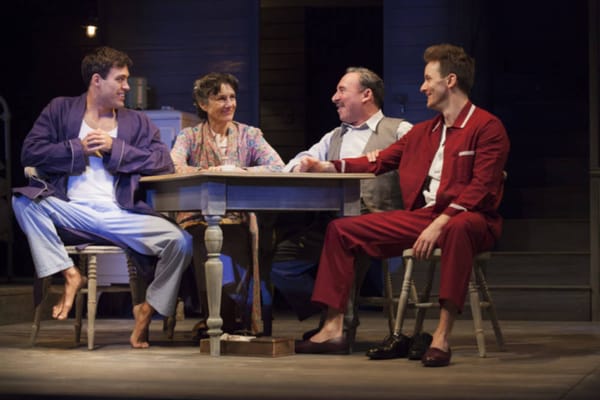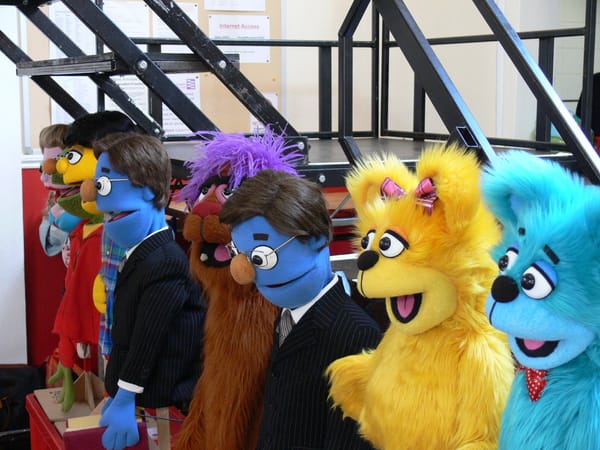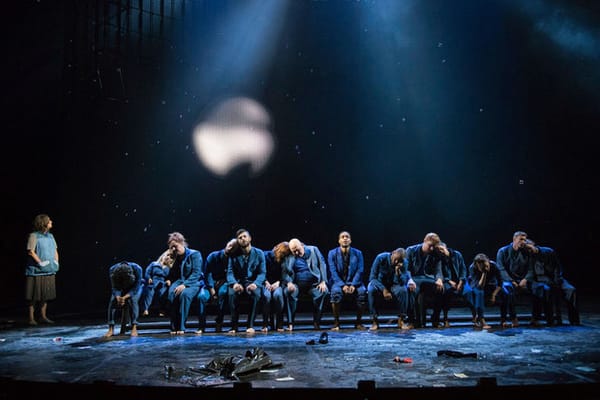Zero-hours in an hour and a half
Jack Steadman is nowhere near beyond caring at the National's Temporary Theatre.

The house lights don’t dim at the start of Beyond Caring. That’s the first thing that went through my head. That, rapidly followed by “hang on, have we even started?” It’s a unique and bold use of the Temporary Theatre, and an instantly striking re-opening for the National’s fourth theatre. Formerly known as The Shed, the Temporary Theatre wasn’t even meant to be here anymore. But here we are, at the start of a new season of innovative and exciting works.
Kicking things off is Beyond Caring, originally penned by Alexander Zeldin before undergoing extensive work through devising with the company. It tells the story of three zero-hour workers, hired to clean a meat factory alongside a full-time cleaner and a vaguely sociopathic boss.
As a consequence, designer Natasha Jenkins has opted to turn the entire space into the meat factory, with the rows of the audience feeling, and looking, as if they have been simply dropped into the space by some unknown force. A fridge, a hot-drink-dispensing vending machine and other break-room clutter are visible off towards one of the emergency exits. On the other side of the room, shelves upon shelves of cleaning equipment sit, looking suspiciously like someone forgot to cover them up before the audience comes in. The whole space feels like that, honestly. Fluorescent lights dangle from the ceiling, acting as the house lights. The Temporary Theatre doesn’t feel like a theatre at all, it doesn’t even feel like a studio space. It feels like meat factory. It’s a masterpiece of minimalist design.
After a few moments of awkward silence, as the front-of-house team close the doors but any actors fail to materialise, one of the emergency exit doors swings open. A man walks in, collects a book from the messy table that sits in the centre of the room, and leaves again. A door slams. Another awkward pause follows. The doors swing open again, and a new figure arrives. They look around awkwardly, waiting for something to happen. The doors swing open again. And so on.
_Beyond Caring _has significant balls, that much is already obvious. It’s willing to leave the audience dangling, providing them with no explanation or description of what’s going on (or even supposed to be going on). All we have to go on is what we see in front of us.
"There's an insidious sense of dread, a pervading discomfort that clings to you."
And what we see is brutal. Nothing truly awful happens here. There are no spectacular outbursts of violence. Nobody dies. There isn’t a hero, with some unspeakable evil he’s destined to confront. None of that. Instead, there’s just an insidious sense of dread, a pervading discomfort that clings to you long after you walk out of the theatre.
The four cleaners, Grace, Susan, Becky and Phil try to make it through each night, leaving as the sun rises. Through the small hours, they clean the various parts of the factory, under the watchful, slightly malicious eye of Ian. Of all the characters, Ian’s is the hardest to get a grip on. His nastiness isn’t always outright cruelty (although it occasionally verges into it), it’s more just an absence of caring. He can’t empathise with the people he sees as beneath him.
This dynamic proves the main driving force of the play, which is otherwise content to simply let its characters be, and to use their mere existence as a window to examine the nature of zero-hours contracts, and what working on one can do to a person. It’s a fully issue-driven play, to the point where a whiteboard behind the box office records the latest news on zero-hour contracts for all to see, often picking up on various political pledges across the board. Before, during, and now after an election that saw a Conservative government with little care for the plight of zero-hour workers, _Beyond Caring _could scarcely feel more topical.
Not that this politics is explicitly addressed in the play, mind. Far from it. This is such a tightly focused piece of work that it doesn’t have time to discuss grand ideas, or even the machinations of government – these are people who are focused on surviving. Their struggles are those of people living from paycheck to paycheck. When two of the girls discover their agency won’t be paying them for another week, their world falls apart. One desperately tries to get a single day off to go and visit her daughter, to no avail. One attempts to deal with the situation she now finds herself in, forced to work because a government agency hasn’t deemed her ‘disabled enough’ to qualify for disability allowance. Political promises don’t enter into it.
All this is sold by the acting. The cast were involved in devising the piece, and it shows, giving their characters a weary, lived-in façade that feels unbearably real. They have arcs, of sorts, and from that they each have redeeming moments – some of which are enough to make you weep. Or at least, they all do, bar Ian. He occasionally provides comic relief, occasionally provides a figure of mutual hatred, but he doesn’t really change. He’s never truly redeemed, which doesn’t do Luke Clarke’s performance justice.
"It's impossible to look away, even when you desperately want to."
This is gut-wrenching stuff, and even though it’s so seemingly mundance on the face of it – wages, hours, illness – it matters so much to the characters, just as it matters so much to so many people in this country, in this moment, that it can’t help but grip you. It’s impossible to look away, even when you desperately want to, even when you need to. These people can’t escape their situation. Why should you be able to?
_Beyond Caring was at the Temporary Theatre (National Theatre) until 23rd May. _









